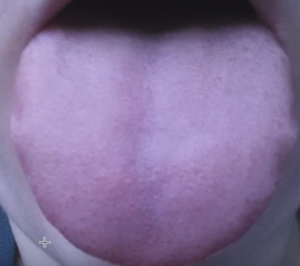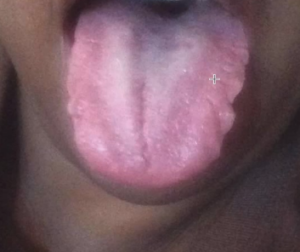A scalloped tongue is one which has dent marks on the sides. These dent marks or indentations typically develop because of the force of teeth when the tongue presses against it. The condition is also known by other names like pie crust tongue, crenated tongue, crenulated tongue, and lingua indentata.
Some of the words used to describe the appearance of a scalloped tongue include a tongue with rippled border; tongue with indentations on the lateral peripheries; teeth marks on the tongue’s side borders; ridges along the lateral sides of the tongue; and tongue with wavy edges, etc.
Scalloped tongue typically occurs when the tongue continuously presses against the teeth, which is what eventually causes the marks on the sides. The tongue may constantly exert pressure on the teeth when it becomes enlarged due to tongue infections or other conditions that affect the organ.
Treatment of scalloped tongue involves treating the underlying condition that causes the tongue to enlarge.
Symptoms of scalloped tongue
A scalloped tongue may occur along with the below listed signs and symptoms:
- Inflammation, swelling, soreness, paleness, and enlargement of the tongue.
- Ridge or dent marks are visible on the side borders of the tongue. Theses grooves or indentations appear like teeth marks.
- There is generally no change in the color of the tongue. Excessive friction of the tongue with the teeth may however cause redness of the lateral edges of the tongue.
- People with scalloped tongue often suffer from varied oral and tongue conditions. These underlying illnesses may be marked by sore throat, swollen tongue, halitosis or bad breath, and tongue pain, etc.
Causes of scalloped tongue
Scalloped tongue is quite harmless and is not a health problem in itself. It is usually a symptom of some other pre-existing disease like sinus issues, arthritis, digestive ailments, iron deficits, or anxiety, etc.
A few common causes of scalloped tongue are listed below:
- Water retention: Varied health conditions like spleen problems, etc. can cause issues with proper conversion of food and liquids into energy, thereby causing water retention. This can then trigger swelling and enlargement of the tongue, eventually causing scalloped tongue.
- Hypothyroidism: It is a condition marked by reduced secretion of thyroid hormone by the thyroid gland. It may be present from birth or it may arise due to conditions such as Hashimoto’s disease, thyroiditis, etc.
- It is known that thyroid hormone is vital to regulation of varied body processes such as metabolism, etc. An underactive thyroid gland thus results in slowdown of varied body processes thereby causing many organs like the tongue, etc. to enlarge. An enlarged tongue subsequently exerts extra force on the teeth and thus causes a scalloped tongue.
- In addition to scalloped tongue, hypothyroidism patients may suffer from symptoms like excessive sensitivity to low temperatures, thick lips, swollen face, fatigue, dry skin, hoarseness, muscle aches, eyelids swelling, thinning of hair, constipation, and depression.
- Hypothyroidism is usually treated with thyroid hormone replacement therapy. Doctors may also recommend treatments like eating foods rich in vitamin B, stress management, acupuncture, radiation therapy, osteopathy, naturopathic drugs, homeopathic medicines, and biofeedback.
- Sleep apnea: Patients of this sleep disorder may suffer from irregular breathing patterns when asleep. They may pause a few times when breathing or breathe slowly. Such breathing disturbances when asleep may cause the tongue to get pulled back into the oral cavity, which then cause the teeth to put additional force on the tongue. Eventually, grooves may develop on the sides of the tongue.
- Temporomandibular joint syndrome: Also called TMJ syndrome, affect people exhibit temporomandibular joint damage which inhibits the functioning of the nerves and muscles that join the skull and the jaw.
- The abnormality of the joint as well as the accompanying ill-fitted teeth may make the lower jaw quite unstable. Subsequently, patients use the tongue to clasp the teeth and provide support to the jaw. They may use the tongue to push against the dental arches, to keep the lower jaw in its original position or to correct the bite and stabilize the jaw when swallowing. When this activity continues for a long time, it may result in formation of fissures on the sides of the tongue. It may be noted that in this case scalloped tongue may develop even if the tongue is not enlarged because of the constant use of the tongue to stabilize the jaw and improve the bite.
- Patients may also suffer from headaches, nerve swelling, jaw popping, bruxism, painful chewing, and swollen face. Surgical remodeling and fixing of the teeth and jaw can help treat TMJ syndrome.
- Mineral and vitamin deficits: Deficiencies in folate and vitamin B12 can trigger the onset of megaloblastic anemia, wherein increased levels of abnormal red blood cells are produced. It also causes the tongue to swell up, thereby resulting in a scalloped tongue. Diet changes and intake of vitamin and folate supplements can help treat the blood disorder.
- Macroglossia: It is condition marked by increased swelling of the tongue. It may occur due to underlying illnesses like oral cancer, tongue cancer, canker sores, scarlet fever, amyloidosis, dehydration, angioedema, and allergies, etc. The enlarged tongue may then continuously press against the teeth, thereby causing scalloped tongue.


